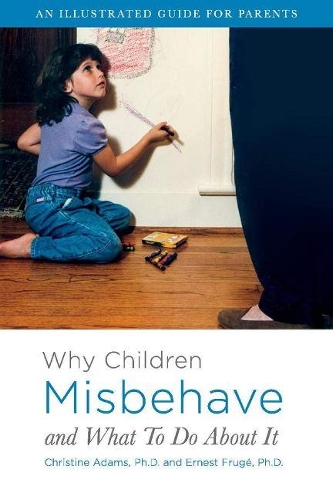
Why Children Misbehave and What To Do About It: An Illustrated Guide for Parents
(Paperback)
Publishing Details
Why Children Misbehave and What To Do About It: An Illustrated Guide for Parents
By (Author) Christine Adams Ph.D.
By (author) Ernest Fruge Ph.D.
BookBaby
BookBaby
11th February 2019
United States
Classifications
General
Non Fiction
Child, developmental and lifespan psychology
Age groups: children
Physical Properties
Paperback
188
Width 152mm, Height 228mm, Spine 12mm
272g
Description
This easy to read book is for parents who want to know how they can effectively correct their children's misbehavior and simultaneously help them learn the skills they need to develop self-control, positive self-esteem and respect for themselves and others. Having a reasonable understanding of why children do what they do and what disciplinary techniques work best is a key first step in successful parenting. The concisely written book has a visually appealing style that makes complicated ideas and methods easier to understand by using photos, graphics, bullet points, and many specific examples of parenting strategies using real life misbehaviors. Included are proven methods for dealing with a range of behavior problems commonly seen in toddlers, preschoolers, and elementary-age children:Temper tantrumsNot sharingUntruthfulnessWhiningNot asking for permissionTaking others' possessionsBad languageInterruptingSassiness, arguing, sarcasmTeasing, making fun of others, braggingStealingThe best parenting methods are ones that continually send the messages of love and respect for oneself and others. Why Children Misbehave And What to Do About It describes methods of approaching discipline that are based on over forty years of research on child development. Discipline means teaching and learning. Effective discipline teaches children how to gain control over their behavior, to adapt to demands of life, and to appreciate the rights and needs of others. With the methods described in this book, you, the parent, will teach your child self-control, consideration for others and self-respect through your own actions. These methods take time to show results, but they make discipline more effective because they lead children to feel valued and to appreciate the benefits of doing the right thing. However, the results are more enduring and lead to more positive day-to-day relationships within the family as a whole.
Author Bio
Ernest Frug, Ph.D., a clinical psychologist, is Professor of Pediatrics and Professor of Medical Ethics and Health Policy at Baylor College of Medicine. He is also Director of the Psychosocial Division of Texas Children's Cancer and Hematology Centers.
